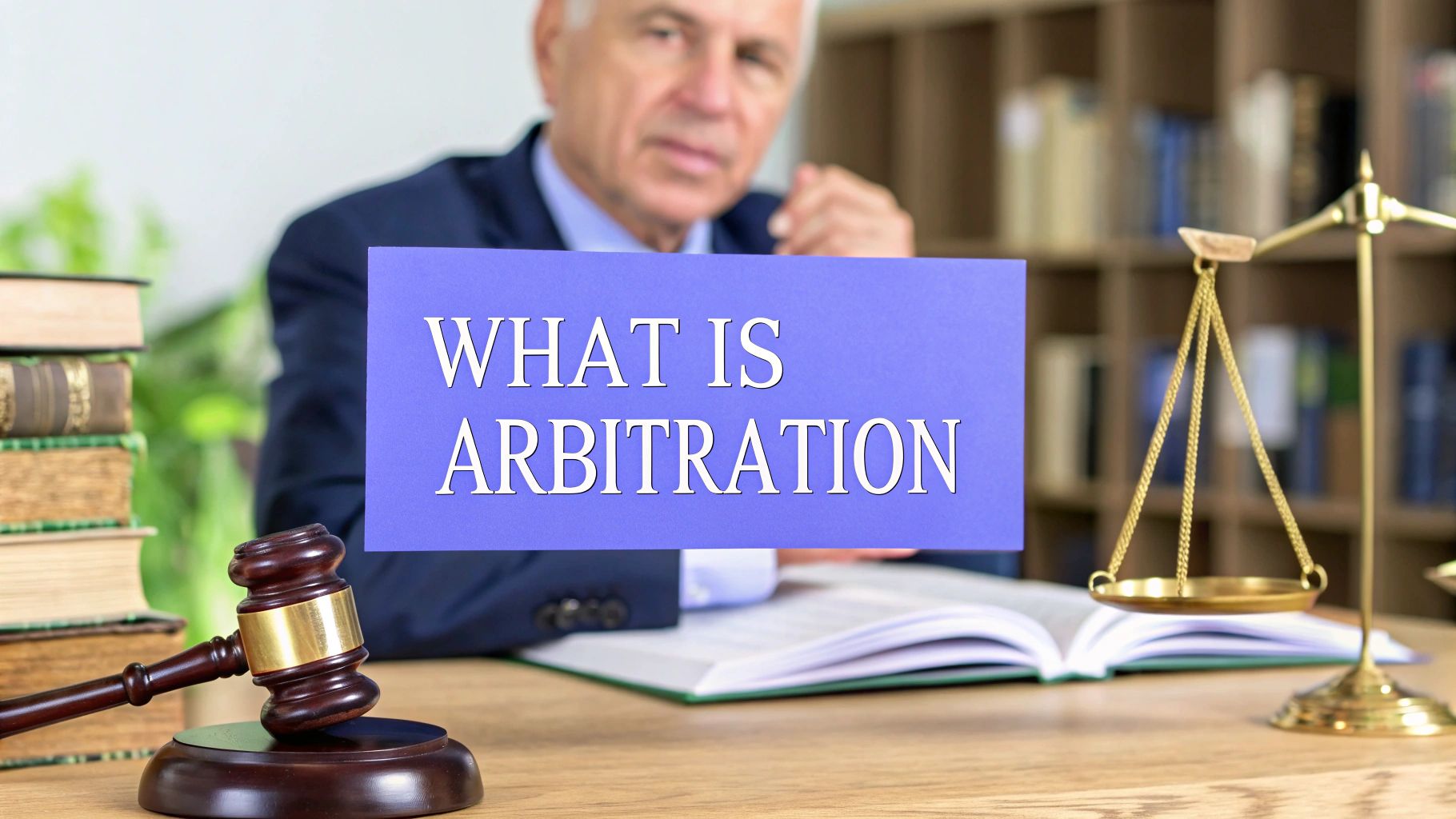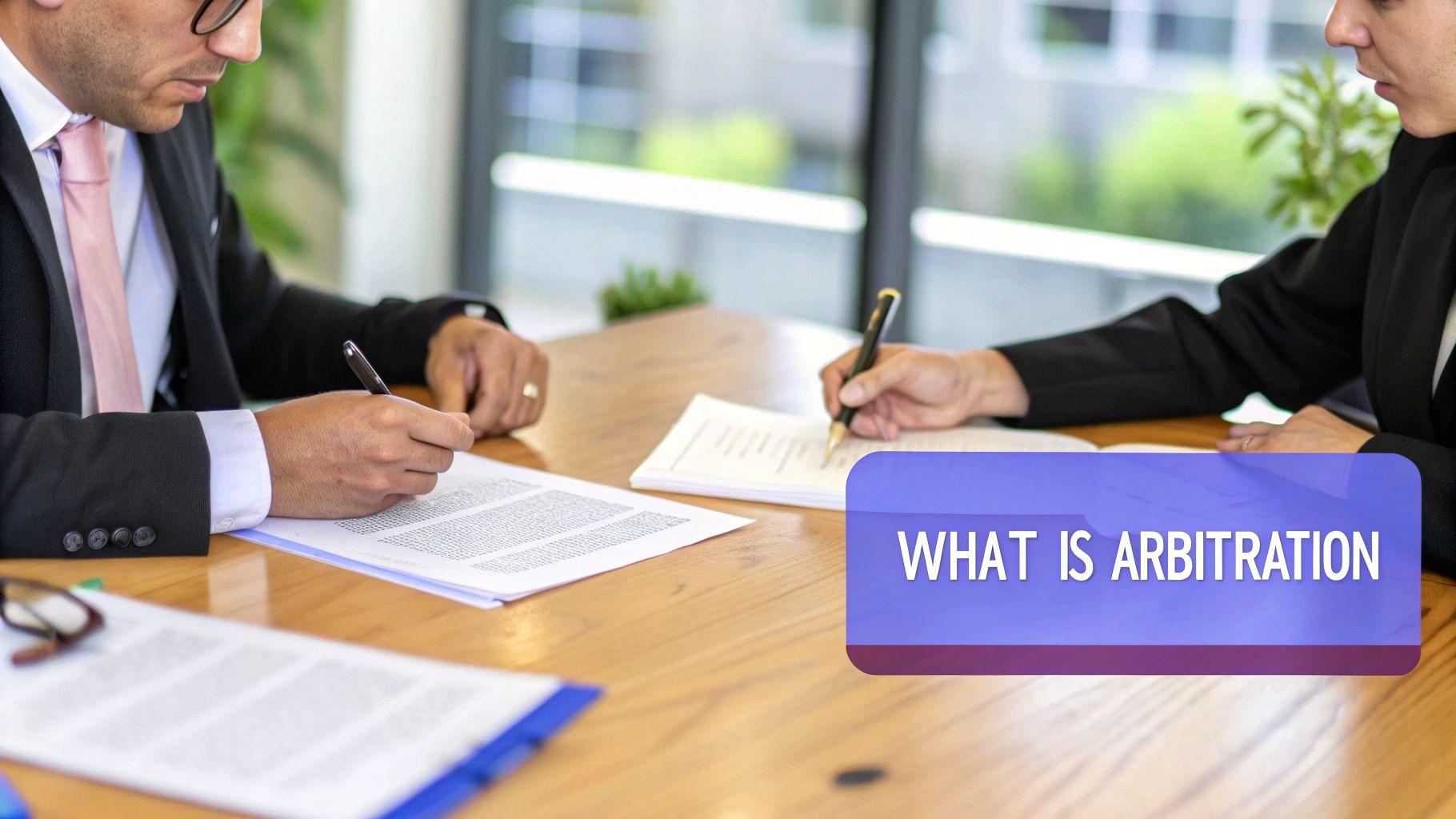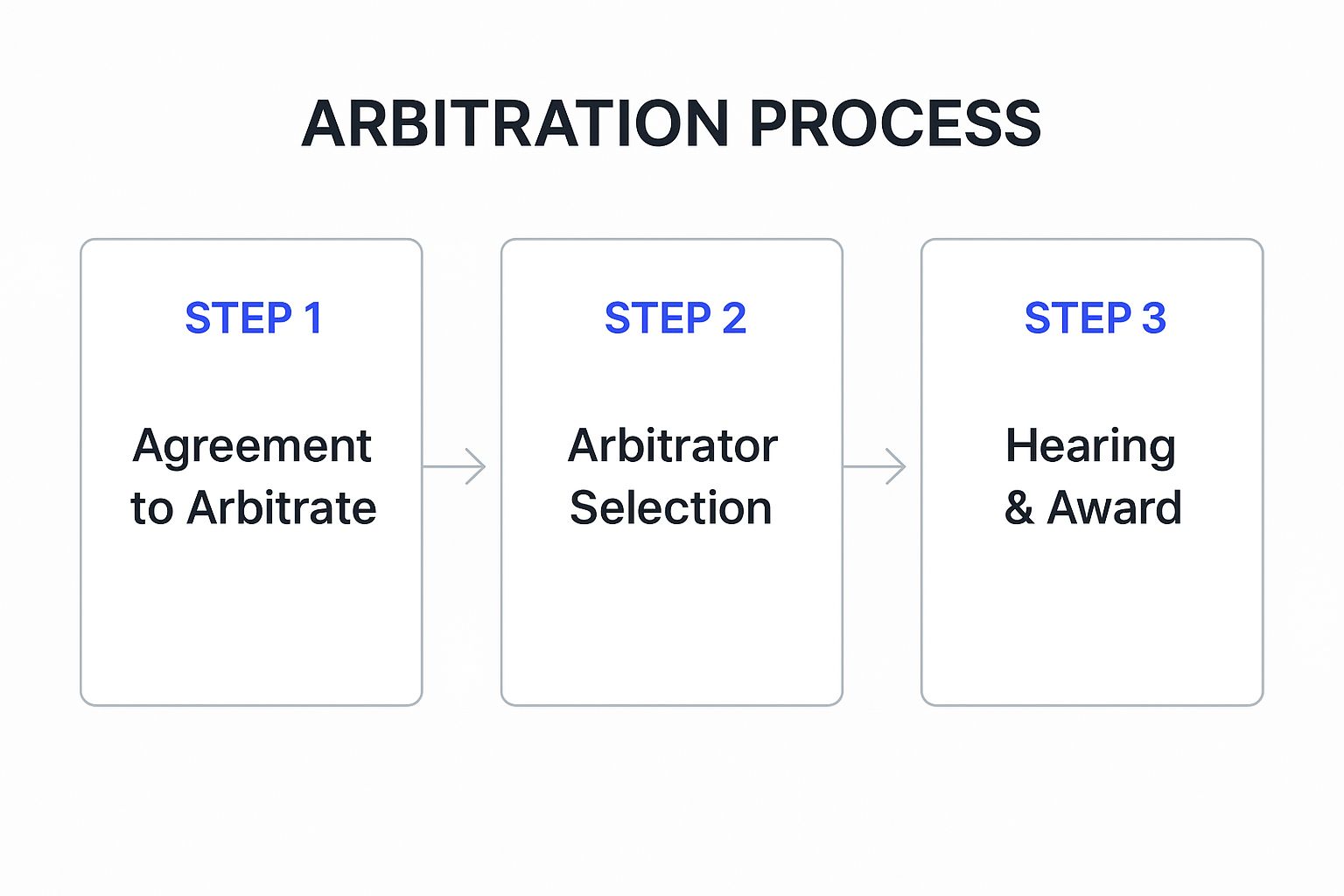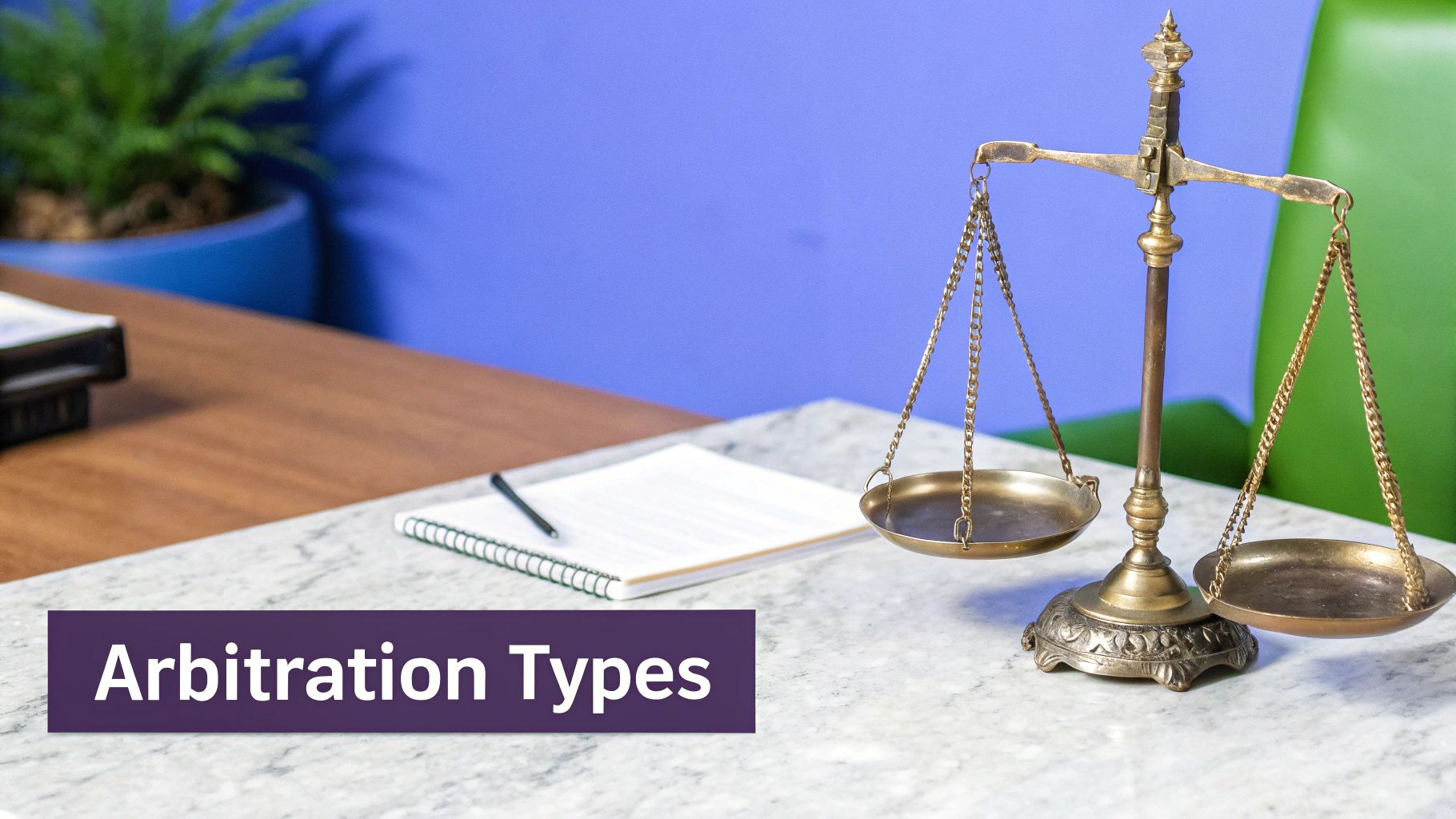
So, what exactly is arbitration? Think of it less like a courtroom showdown and more like hiring a private, expert referee to make a final call on a disagreement. It’s a way to resolve disputes that’s both private and legally binding, keeping you out of the public court system.
The Core Concept of Arbitration

Arbitration is a well-known form of alternative dispute resolution (ADR). It’s where two parties agree to let a neutral third party—the arbitrator—settle their conflict.
Instead of filing a lawsuit, both sides present their case to this arbitrator. The arbitrator then makes a decision, known as an "award," which is almost always final and can be enforced by law.
The whole process hinges on mutual agreement. You can't be pulled into arbitration unless you’ve already agreed to it, which usually happens through an arbitration clause hidden in a contract. This is a perfect example of why you need to know what’s in your legal documents—you could be signing away your right to go to court without even realizing it. If you need a refresher, we have a helpful guide to understanding common legal jargon.
A Long-Standing Practice
While it might seem like a modern fix for overflowing court dockets, arbitration has been around for ages. The practice of using an impartial third party to settle disagreements dates all the way back to ancient Mesopotamian and Roman law, where it was a common way to handle business disputes efficiently.
The fundamental idea has never changed: find a quicker, more specialized route to a final decision. Today, you’ll see it used everywhere:
- Commercial Disputes: Companies arguing over the terms of a contract.
- Employment Issues: Conflicts related to wrongful termination or contract violations.
- Consumer Conflicts: Disagreements between a customer and a business.
To get a clearer picture, here’s a simple breakdown of what arbitration involves.
Arbitration at a Glance
This table breaks down the essential features of arbitration to give you a quick, at-a-glance understanding.
| Feature | Simple Explanation |
|---|---|
| Process | A private hearing where both sides present their case to a neutral arbitrator. |
| Decision-Maker | An impartial arbitrator, often an expert in the relevant field. |
| Outcome | A legally binding decision called an "award." |
| Cost | Generally less expensive than going to court. |
| Speed | Typically much faster than the traditional court process. |
| Confidentiality | The proceedings and outcome are kept private, unlike public court records. |
| Formality | Less formal than a courtroom, with more flexible rules for evidence. |
| Appeals | Very limited grounds for appeal, making the decision final in most cases. |
Essentially, arbitration offers a streamlined and private path to resolving conflicts, which can be a huge advantage over the public, often slow-moving court system.
The real value of arbitration is its ability to offer a private, efficient, and final alternative to litigation. It empowers parties to choose an expert who truly understands their industry to make a practical and informed decision.
How the Arbitration Process Works Step by Step
To really get what arbitration means, you have to see it in action. While the exact rules can shift depending on what everyone agreed to, most proceedings follow a pretty standard path. Think of it as a streamlined roadmap for solving a fight without having to go through a public court.
The whole thing usually kicks off long before there's even a problem, often with just a single sentence tucked away in a contract. This arbitration clause is the trigger, locking both sides into this process if a conflict ever pops up.
Stage 1: The Agreement and Initial Filing
The first real move is the Demand for Arbitration. This is where one party officially tells the other they’re starting the process, laying out what the dispute is about and what they want to happen. This notice is usually filed with an organization that manages these cases, like the American Arbitration Association (AAA).
Once that demand is filed, the other party—the respondent—gets their turn. They submit an Answering Statement, where they respond to the claims and can even bring up their own counterclaims. This back-and-forth sets the boundaries for the whole process, clearly defining what needs to be sorted out.
At its heart, the arbitration process is built for speed. Court battles can drag on for years, but arbitration is designed to get from claim to resolution in just a few months. Some cases even wrap up in as little as 90 days.
Stage 2: Selecting the Arbitrator
With the claims officially on the table, the next big step is picking the neutral third party who will make the final call. This is a huge departure from the court system. Instead of getting a judge assigned to you, the parties actually get a say in choosing their arbitrator (or a panel of them).
The selection process usually looks something like this:
- Reviewing a list: The AAA or a similar group sends over a list of qualified arbitrators, complete with bios that highlight their specific areas of expertise.
- Ranking or striking: Each side gets to cross off names they don't want and rank the ones they do.
- Final appointment: The organization then appoints an arbitrator who is acceptable to everyone involved, ensuring a fair and impartial process.
This is a massive advantage. It means you can pick someone who actually understands the nuts and bolts of your industry—whether it's construction, tech, or finance. You get a decision-maker who already speaks your language.
The infographic below breaks down the main phases of the process.

This visual gives you a quick look at how the process moves from that initial agreement all the way to a final, binding decision.
Stage 3: The Hearing and Final Award
After an arbitrator is on board, both sides swap relevant documents and information. It's a bit like the "discovery" phase in a lawsuit, but way less formal and drawn out. This all leads up to the main event: the arbitration hearing.
Think of the hearing as a private trial. Each side presents their evidence, brings in witnesses, and makes their case. But it’s all happening in a much more relaxed setting than a courtroom, and the formal rules of evidence don't really apply. The goal is to get to the truth of the matter as efficiently as possible.
Once all the evidence and arguments have been heard, the arbitrator issues a final written decision, known as the award. This decision is legally binding and can be enforced in court. And here’s the kicker: unlike a court verdict, an arbitration award is incredibly tough to appeal, which means the dispute is truly over.
Arbitration vs. Litigation: Key Differences Explained

When a dispute arises, you’re faced with a critical choice: arbitration or a traditional lawsuit? While both paths aim to resolve the issue, they operate on completely different tracks. The lawsuit path is called litigation, and understanding how it differs from arbitration is key to picking the right one for your situation.
Litigation is what most people picture when they think of legal battles—a public process playing out in a courtroom with a judge, jury, and a mountain of procedural rules. Arbitration, on the other hand, is a private, more flexible alternative that both sides agree to use instead of going to court.
Think of it this way: litigation is like a formal, primetime network TV drama, broadcast for all to see. Arbitration is more like a private, on-demand streaming service that you and the other party subscribe to for your specific issue.
To get a clearer picture, let's break down the main distinctions between these two approaches. The table below offers a quick, side-by-side look at how they stack up.
Comparing Arbitration and Litigation
| Factor | Arbitration | Litigation (Court) |
|---|---|---|
| Venue | Private, confidential setting (often an office) | Public courtroom |
| Decision-Maker | Neutral arbitrator(s) chosen by the parties | Judge and/or jury |
| Timeline | Typically months | Often 2-3 years or more |
| Cost | Generally lower, but arbitrator fees apply | Can be very high due to lengthy procedures |
| Formality | Flexible rules agreed upon by the parties | Strict, formal rules of procedure and evidence |
| Confidentiality | Proceedings and outcomes are private | Everything is a matter of public record |
| Finality | Decision is binding with very limited appeal | Decisions can be appealed through the court system |
As you can see, the differences are significant and can have a major impact on the time, money, and exposure involved in resolving a dispute. Let's dig a little deeper into what these differences mean in practice.
Speed and Efficiency
One of the biggest selling points for arbitration is the timeline. The public court system is notoriously backlogged, and a lawsuit can easily drag on for years before you get a resolution.
Arbitration was designed for speed. By staying out of the court system, you sidestep most of the procedural delays and drawn-out discovery battles that bog down litigation. It’s not unusual for an arbitration to wrap up in a few months—a huge difference from the 2-3 year average for many civil court cases.
The core appeal of arbitration lies in its efficiency. Parties can often get a binding decision faster and with less administrative burden, saving invaluable time and resources that would otherwise be spent in prolonged legal battles.
Cost Considerations
Faster resolutions usually mean lower costs. While you have to pay the arbitrator's fees in arbitration, you often avoid the endless motions, depositions, and court appearances that make litigation so expensive. The longer a dispute drags on, the higher the legal bills climb.
By condensing the process, arbitration can be a much more budget-friendly option, especially for straightforward business disputes. Just keep in mind that complex arbitrations with a panel of three arbitrators can also get pricey.
Privacy and Confidentiality
This is a major dividing line. Court proceedings are public record. Every filing, hearing, and judgment is accessible to anyone, which can be a disaster for businesses trying to protect trade secrets or their reputation.
Arbitration, by contrast, happens entirely behind closed doors.
- Confidential Hearings: The proceedings are private, attended only by the parties involved.
- Private Documents: All evidence, arguments, and filings are kept confidential.
- Sealed Outcomes: The final decision, or "award," is not part of the public record.
This level of privacy is a huge draw. It's a key reason why 85% of international arbitrations in leading hubs like London are held there—businesses trust that their sensitive matters will stay private. For a deeper look into this topic, you can learn more about different approaches to contract dispute resolution.
Formality and Flexibility
Litigation operates under rigid rules of procedure and evidence that have been built up over centuries. There’s very little wiggle room.
Arbitration is far more adaptable. The parties can agree on the rules, pick an arbitrator who has specific expertise in their industry, and structure hearings in a way that makes sense for their unique dispute. This less formal atmosphere allows everyone to focus more on the substance of the conflict and less on procedural technicalities.
Weighing the Pros and Cons of Arbitration
Choosing between arbitration and a public court case is a strategic decision, and there’s no single right answer. Arbitration is often praised for being fast and private, but it's not a silver bullet for every conflict. You need to understand both its strengths and weaknesses to decide if it’s the right move for your situation.
One of its biggest draws is confidentiality. Court records are public, but arbitration happens behind closed doors. For businesses trying to protect trade secrets, sensitive financials, or their brand reputation, this privacy is a huge advantage.
Another major plus is the ability to pick your judge. Instead of a generalist judge who might not know your industry, you can choose an arbitrator who’s an expert in your field. This is a game-changer in highly technical disputes involving construction, tech, or finance, as it ensures the decision is grounded in real-world knowledge.
The Upsides: Why Choose Arbitration?
The benefits of arbitration often line up perfectly with what modern businesses need: speed, expertise, and a final, binding decision. These factors can make it a much better option than a drawn-out, public court battle.
Here’s why many people lean toward arbitration:
- Global Enforceability: It's often much easier to enforce an arbitration award in another country than a court judgment. This is largely thanks to international agreements like the New York Convention.
- Procedural Flexibility: You and the other party can agree on your own rules for evidence and procedure. This makes the process less rigid and keeps everyone focused on the real issues.
- Finality: The grounds for appealing an arbitrator's decision are extremely limited. This provides a clear end to the conflict, letting both sides move on without worrying about endless legal challenges.
The Downsides: What Are the Risks?
Of course, arbitration has its drawbacks, and they can be significant. The same finality that makes it so appealing can become a massive risk if the decision doesn't go your way.
The limited right to appeal means you’re pretty much stuck with the arbitrator's decision, even if you think it's legally wrong. There's no higher court to review the case on its merits, which is a key safeguard you get with traditional litigation.
Costs can also be a bit misleading. While arbitration can be cheaper than a court case overall, you have to pay the arbitrator's fees upfront, and they can be hefty. If your case is complex and requires a panel of three arbitrators, those fees add up fast.
The choice to arbitrate really comes down to one question: Are the benefits of a private, expert-led process worth the risk of a final decision you can't appeal?
There's no denying its popularity for international disputes. The 2025 International Arbitration Survey, which included responses from over 2,400 practitioners, found that a staggering 87% prefer it for cross-border conflicts. The top reasons were enforceability, neutrality, and confidentiality. You can explore the full findings on international arbitration trends and see for yourself why it remains the top choice for global business.
Common Examples of Arbitration in Action

To really get what arbitration means, it helps to see how it plays out in the real world. This process isn't some dusty legal theory; it's a practical tool used every single day across different industries to sort out disputes quietly and effectively.
Let’s start with a classic business scenario. A software company gets hired to build a custom platform, but they deliver it three months late and with key features missing. The client, losing money and patience, holds back the final payment. Instead of airing their dirty laundry in a public court battle that could tank both of their reputations, their contract points them toward arbitration.
They bring in an arbitrator with 20 years of experience in software development. This isn't just a random judge; it's an expert who can quickly grasp the technical arguments, figure out if the project's scope was met, and decide whether the final product lived up to the contract.
Business and Commercial Disputes
Arbitration is a fixture in modern business, especially when contracts go sideways. The confidentiality and access to industry-specific experts make it a no-brainer for many companies.
- Partnership Disagreements: When business partners hit a wall over company direction or how to split profits, an arbitrator can step in and make a binding call that keeps the business from falling apart.
- Supplier Conflicts: Imagine a manufacturer gets a shipment of raw materials that aren't up to snuff. Instead of grinding operations to a halt for a court case, they can bring in an arbitrator with a manufacturing background to assess the materials and settle the matter quickly.
The global stage for arbitration is constantly shifting, influenced by big economic and geopolitical moves. These shifts have kicked off a wave of disputes in sectors like construction, transport, and energy—all industries that lean heavily on arbitration. As a result, the top institutions are seeing near-record caseloads. You can explore the latest international arbitration update to see the trends.
Construction and Employment Scenarios
Beyond the boardroom, arbitration is also common ground for construction and employment issues, where technical know-how and privacy are critical.
Think about a homeowner who feels their contractor overcharged them by $50,000 for a kitchen remodel while using cheap materials. Their agreement has an arbitration clause. Rather than getting bogged down in a lengthy court process, they can present their case to an experienced contractor or construction lawyer acting as the arbitrator. This expert can properly evaluate project costs, material quality, and workmanship to deliver a fair, final decision.
It works similarly in employment disputes. An executive might be fired and believe it violates the "for cause" provision in their contract. To keep sensitive performance reviews and company details out of the public record, both sides head to arbitration. The arbitrator, typically a veteran employment lawyer, privately reviews the evidence and makes a final ruling on whether the termination was valid.
What Makes a Strong Arbitration Clause
A good arbitration process doesn’t just happen when a fight breaks out—it starts the moment you sign the contract. A poorly written arbitration clause can backfire spectacularly, causing the very confusion and expense you were trying to avoid.
Think of it as the blueprint for how you'll handle future disagreements. If that blueprint is smudged or vague, the whole structure you’re relying on becomes wobbly.
A solid clause is a clear roadmap. It leaves no room for guessing games. It needs to spell out exactly what issues it covers. For example, does it only apply to a breach of contract, or does it cover every dispute that could possibly arise from your business relationship? Being specific is your best defense against arguments down the line. Without it, you might find yourself in court, ironically arguing about what your out-of-court agreement was supposed to mean.
Key Components of an Effective Clause
To make sure your arbitration clause is airtight and actually enforceable, it has to include a few non-negotiable elements. If you skip these, you’re just setting yourself up for procedural headaches and extra legal bills later.
Here’s what every strong clause needs:
- Scope of Disputes: The clause must clearly define which disagreements go to arbitration. A broad scope might say something like, "any and all disputes arising from or related to this agreement."
- Governing Rules: It should name the organization whose rules will be followed, like the American Arbitration Association (AAA) or JAMS. This gives you a ready-made procedural framework.
- Seat of Arbitration: The clause must specify the city or location (the "seat") where the arbitration legally happens. This is crucial because it determines which laws govern the arbitration process itself.
- Number of Arbitrators: You need to decide if you want a single arbitrator or a panel of three. For smaller disputes, a single arbitrator is almost always faster and cheaper.
A well-constructed arbitration clause is proactive, not reactive. It anticipates potential points of conflict and provides a clear, mutually agreed-upon procedure for resolving them before they escalate.
Getting these details right from the start is critical. To make sure you’re protected, it's vital to know how to review a contract inside and out, especially when an arbitration clause is on the table. For a deeper dive, check out our guide on what an arbitration clause is for more insights.
Got Questions About Arbitration?
Even after you get the basics down, a few practical questions always seem to pop up. Thinking about how arbitration works in the real world is the best way to clear up any lingering confusion. Here are some straightforward answers to the most common ones.
Is an Arbitrator's Decision Legally Binding?
Yes, in almost every situation. The arbitrator's final decision, known as an "award," is legally binding and can be enforced in court just like a judge's ruling. Because both sides agree from the start to accept the outcome, the grounds for an appeal are incredibly narrow. This brings a real sense of finality to the dispute.
Who Pays for the Arbitration Process?
Typically, the parties split the costs. These expenses usually cover the arbitrator's fees, any administrative costs from the managing organization (like the AAA), and of course, each side's own legal bills. Sometimes, the original contract will spell out exactly how costs are divided, or the arbitrator can make that decision as part of the final award.
Can I Be Forced Into Arbitration?
You can only be required to arbitrate a dispute if you've already agreed to it. This agreement usually lives inside an "arbitration clause" tucked into a contract you've signed—think employment agreements, service contracts, or even your cell phone plan.
By signing a contract with an arbitration clause, you are usually waiving your right to sue in court for any disputes covered by that clause. It's one of the most critical terms to look out for.
This is why it's so important to understand every part of an agreement before you sign.
Don't let complex legal language leave you guessing about your rights and obligations. The Legal Document Simplifier can instantly translate dense contracts into clear, actionable summaries, so you always know what you're agreeing to. Try it today and take control of your legal documents.